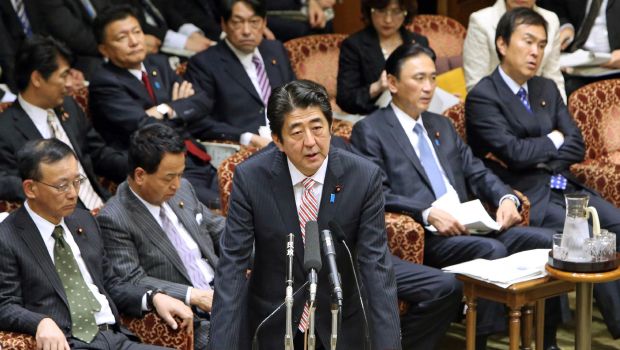
Japanese Prime Minister Shinzo Abe answers a question during the Upper House’s audit committee session at the National Diet in Tokyo on November 25, 2013. (AFP PHOTO/JIJI PRESS)
Abe told a parliamentary session that China’s declaration of an air defense identification zone alters the state of affairs in the East China Sea and escalates a tense situation.
“The measures by the Chinese side have no validity whatsoever for Japan, and we demand China revoke any measures that could infringe upon the freedom of flight in international airspace,” Abe said. “It can invite an unexpected occurrence and it is a very dangerous thing as well.”
On Saturday, Beijing issued a map of the zone and a set of rules that say all aircraft must notify Chinese authorities and are subject to emergency military measures if they do not identify themselves or obey Beijing’s orders.
Abe said the measures one-sidedly impose rules set by the Chinese military on all flights in the zone, and violate the freedom to fly above open sea, a general principle under international law. He also slammed China for showing the disputed islands, called Senkaku in Japanese and Diaoyu in Chinese, as Chinese territory in the zone.
Since taking office almost a year ago, Abe has been spearheading a move to step up Japan’s defense capability, citing threats from China’s growing maritime and military presence in the region. Japan has had a similar zone since the 1960s.
Later Monday, Japanese Vice Foreign Minister Akitaka Saiki summoned Chinese Ambassador Cheng Yonghua to protest the move in person, a day after Saiki’s deputy protested to China by phone. But Cheng balked at Japan’s complaint, refusing to retract the measures.
“China believes it is the Japanese side that should withdraw its unreasonable demand,” Cheng told reporters after meeting with Saiki. “But both of us should try to take cautionary steps in order to prevent unanticipated occurrences.”
South Korea also complained Monday about the Chinese zone, which includes the airspace above a set of submerged rocks that are controlled by Seoul but also claimed by Beijing.
South Korea’s Defense Ministry summoned China’s military attache in Seoul, saying the zone is unacceptable because it was drawn unilaterally, according to ministry officials. Defense Ministry spokesman Kim Min-seok said South Korea’s control over the area remains unchanged and that Seoul won’t notify China when its planes pass through the region.
Earlier Monday, China’s Foreign Ministry said it had complained to the United States over its “irresponsible remarks” about China’s drawing up of the zone for the disputed islands, which are administered by Japan.
China’s Defense Ministry also called Japan’s objections to its East China Sea Air Defense Identification Zone “absolutely groundless and unacceptable” and said it had protested to the Japanese Embassy in Beijing.
Foreign Ministry spokesman Qin Gang said in a statement Sunday that the zone’s aim is to defend China’s sovereignty and the security of its airspace and land. He said it is not aimed at any country and it does not affect freedom of overflight.
US Secretary of State John Kerry and Secretary of Defense Chuck Hagel have both said the US is “deeply concerned” about China’s action.
Qin said China told US Ambassador Gary Locke on Sunday that the US should “correct its mistakes and stop making irresponsible remarks on China.”
Defense Ministry spokesman Yang Yujun said the ministry had complained to the US Embassy’s military attache on Sunday evening.
The US doesn’t take a position on who has sovereignty over the islands, but recognizes they are under Japanese administration.
